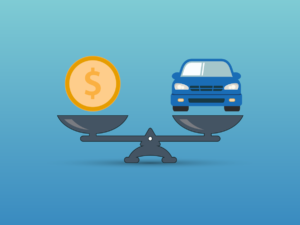Why It Might Be Wise to Refinance a Car
Most people refinance a car loan to 1) lower their monthly payments, 2) decrease their interest rates, or 3) remove (or add) someone on their loans. Let’s look at each reason for refinancing.
1. Lower Your Monthly Car Payments
One of the most common reasons people have to refinance their car loans is to lower their monthly payments.
When you refinance, your lender issues you a new loan. This new loan can have a lower monthly payment if it offers a lower interest rate, extends your loan term, or a combination of both.
A lower interest rate is always a good thing because until your loan is paid back, you have to pay your lender interest on the outstanding loan balance. So, holding the term length constant, a lower interest rate will decrease how much you pay for your loan in the long-run.
It is your new loan term length that warrants a closer look.
If your new loan extends the number of months over which you pay for your car, your payments will be lower assuming that a) your interest rate is not higher than before refinancing and b) you do not finance too many additional costs into your new loan. Again, lower payments are a good thing. However, because of the way car loan interest works, the more months over which you pay for your car, the more interest charges you pay for with your payments. So, if you extend your loan term, you may pay more for your car cumulatively over the term length of your loan.
What Could Happen to Your Monthly Payments When You Refinance a Car
For example, let’s say you took out a loan one year ago for $20,000 at 6% interest rate for a loan length of 48 months. Your monthly payments on this loan would be $469.70. After 12 months of payments, you decide to refinance your loan. If you simply lower your interest rate to, say, 3%, but do not extend your loan term, your new payments would be $449.01. While the payments are not much lower, you will pay less for your car in the end.
Now, let’s say instead of lowering your interest rate, you simply extend your loan term by 12 months. In this case, your new payments would be $362.61. These payments are over $100 less than your previous loan’s payments; however, in the end, you will pay more for your car because you will pay more interest charges over the life of your loan.
Neither of these scenarios may sound that beneficial. But let’s say you refinance your loan such that you lower your interest rate to 3% AND extend your loan term by 12 months. For this new loan, your new payments would be $341.75 (versus $469.70 originally) and you would save over $500 in interest charges over the course of your loan!
2. Reduce Your Interest Rate
While many refinance customers are concerned with their car loan payments, some focus on how much they will pay for their cars in total.
As the example above illustrates, monthly payments do not tell the whole story when you consider how much you pay for your car. If you are paying a high-interest rate over a long loan term, you may have low monthly payments, but you will end up paying a great deal of money for your car by the end of your loan. For this reason, some refinance customers seek primarily to lower their interest rates.
A lower interest rate means lower interest charges per month, which in turn means that a larger portion of your monthly payments go towards paying your car loan principal (i.e. how much you borrowed) and less goes towards paying interest to your lender.
3. Remove (or Add) a Co-borrower
Not all people refinance to save money. Some car owners may refinance simply to remove (or add) a co-borrower. In such cases, however, it never hurts to also seek to to save on both payments and interest charges.







